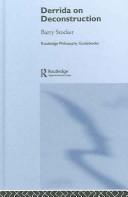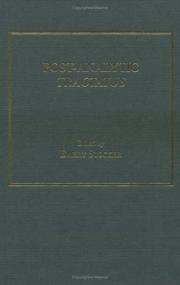| Listing 1 - 10 of 13 | << page >> |
Sort by
|

ISBN: 9780415325028 9780415325011 0415325013 0415325021 9780203358115 9781134343768 9781134343805 9781134343812 Year: 2006 Volume: *7 Publisher: London Routledge
Abstract | Keywords | Export | Availability | Bookmark
 Loading...
Loading...Choose an application
- Reference Manager
- EndNote
- RefWorks (Direct export to RefWorks)
Derrida, Jacques --- Deconstruction. --- Derrida, Jacques. --- Derrida, Jacques, --- Deconstructie --- Deconstruction --- Déconstruction --- Criticism --- Semiotics and literature --- Derrida, J. --- Derida, Žak --- Derrida, Jackes --- Derrida, Zhak --- Deridah, Z'aḳ --- Deridā, Jāka --- Dirīdā, Jāk --- Деррида, Жак --- דרידה, ז'אק --- Derrida, Jacques, - 1930-2004

ISBN: 075461297X Year: 2004 Publisher: Aldershot : Ashgate,
Abstract | Keywords | Export | Availability | Bookmark
 Loading...
Loading...Choose an application
- Reference Manager
- EndNote
- RefWorks (Direct export to RefWorks)
Logic [Symbolic and mathematical ] --- Logica [Symbolische en wiskundige ] --- Logique symbolique et mathémathique --- Metafysica --- Metaphysics --- Métaphysique --- Language and languages --- -Logic, Symbolic and mathematical --- God --- Ontology --- Philosophy --- Philosophy of mind --- Algebra of logic --- Logic, Universal --- Mathematical logic --- Symbolic and mathematical logic --- Symbolic logic --- Mathematics --- Algebra, Abstract --- Metamathematics --- Set theory --- Syllogism --- Foreign languages --- Languages --- Anthropology --- Communication --- Ethnology --- Information theory --- Meaning (Psychology) --- Philology --- Linguistics --- Wittgenstein, Ludwig --- Language and logic --- Linguistics and logic --- Logic in language --- Logic --- Semantics --- Wittgenstein, Ludwig,
Book
ISBN: 3319658905 3319658913 Year: 2018 Publisher: Cham : Springer International Publishing : Imprint: Palgrave Macmillan,
Abstract | Keywords | Export | Availability | Bookmark
 Loading...
Loading...Choose an application
- Reference Manager
- EndNote
- RefWorks (Direct export to RefWorks)
This book explores the aesthetics of the novel from the perspective of Continental European philosophy, presenting a theory on the philosophical definition and importance of the novel as a literary genre. It analyses a variety of individuals whose work is reflected in both theoretical literary criticism and Continental European aesthetics, including Mikhail Bakhtin, Georg Lukács, Theodor Adorno, and Walter Benjamin. Moving through material from eighteenth century and ancient Greek philosophy and aesthetics, the book provides comprehensive coverage of the major positions on the philosophy of the novel. Distinctive features include the importance of Vico’s view of the epic to understanding the novel, the importance of Kierkegaard’s view of the novel and irony along with his other aesthetic views, the different possibilities associated with seeing the novel as ‘mimetic’ and the importance of Proust in understanding the genre in all its philosophical aspects, relating the issue of the philosophical aesthetics of the novel with the issue of philosophy written as a novel and the interaction between these two alternative positions.
Literature --- Philosophy in literature. --- Literature and philosophy --- Philosophy and literature --- Philosophy. --- Theory --- Aesthetics. --- Literature-Philosophy. --- Literature-History and criticism. --- Literary Theory. --- Literary History. --- Beautiful, The --- Beauty --- Esthetics --- Taste (Aesthetics) --- Philosophy --- Art --- Criticism --- Proportion --- Symmetry --- Psychology --- Literature—Philosophy. --- Literature—History and criticism. --- Radio broadcasting Aesthetics --- Aesthetics
Book
ISBN: 1351909746 9781351909747 Year: 2017 Publisher: Aldershot, Hants, England ; Burlington, VT : Ashgate,
Abstract | Keywords | Export | Availability | Bookmark
 Loading...
Loading...Choose an application
- Reference Manager
- EndNote
- RefWorks (Direct export to RefWorks)
US and European scholars of philosophy offer a variety of new ways to look at German philosopher Ludwig Wittgenstein's (1889-1951) Tractatus Logico-Philosophicus, including approaches from Continental European philosophy and links to the thinking of Kant, Schopenhauer, Kierkegaard, and others. Among their topics are logic and ethics as the limits of the world, the extent to which solipsism is a truth, making sense of nonsense, an example of saying and showing from Anscombe, transcendence and contradiction, and onto-logic. One of the ten essays is reprinted. Annotation :2004 Book News, Inc., Portland, OR (booknews.com).
Digital
ISBN: 9783319658919 Year: 2018 Publisher: Cham Springer International Publishing :Imprint: Palgrave Macmillan
Abstract | Keywords | Export | Availability | Bookmark
 Loading...
Loading...Choose an application
- Reference Manager
- EndNote
- RefWorks (Direct export to RefWorks)
This book explores the aesthetics of the novel from the perspective of Continental European philosophy, presenting a theory on the philosophical definition and importance of the novel as a literary genre. It analyses a variety of individuals whose work is reflected in both theoretical literary criticism and Continental European aesthetics, including Mikhail Bakhtin, Georg Lukács, Theodor Adorno, and Walter Benjamin. Moving through material from eighteenth century and ancient Greek philosophy and aesthetics, the book provides comprehensive coverage of the major positions on the philosophy of the novel. Distinctive features include the importance of Vico’s view of the epic to understanding the novel, the importance of Kierkegaard’s view of the novel and irony along with his other aesthetic views, the different possibilities associated with seeing the novel as ‘mimetic’ and the importance of Proust in understanding the genre in all its philosophical aspects, relating the issue of the philosophical aesthetics of the novel with the issue of philosophy written as a novel and the interaction between these two alternative positions.
Philosophy --- Aesthetics --- Linguistics --- Literature --- History --- geletterdheid --- esthetica --- filosofie --- literatuur --- literatuurgeschiedenis
Book
ISBN: 9783110359367 9783110359459 Year: 2014 Volume: 3 Publisher: Berlin De Gruyter
Abstract | Keywords | Export | Availability | Bookmark
 Loading...
Loading...Choose an application
- Reference Manager
- EndNote
- RefWorks (Direct export to RefWorks)
Book
ISBN: 9783110554717 3110554712 Year: 2017 Publisher: Berlin : De Gruyter,
Abstract | Keywords | Export | Availability | Bookmark
 Loading...
Loading...Choose an application
- Reference Manager
- EndNote
- RefWorks (Direct export to RefWorks)
Book
ISBN: 1137547944 1137547936 1803161825 Year: 2018 Publisher: London : Palgrave Macmillan UK : Imprint: Palgrave Macmillan,
Abstract | Keywords | Export | Availability | Bookmark
 Loading...
Loading...Choose an application
- Reference Manager
- EndNote
- RefWorks (Direct export to RefWorks)
This comprehensive Handbook presents the major perspectives within philosophy and literary studies on the relations, overlaps and tensions between philosophy and literature. Drawing on recent work in philosophy and literature, literary theory, philosophical aesthetics, literature as philosophy and philosophy as literature, its twenty-nine chapters plus substantial Introduction and Afterword examine the ways in which philosophy and literature depend on each other and interact, while also contrasting with each other in that they necessarily exclude or incorporate each other. This book establishes an enduring framework for structuring the broad themes defining the relations between philosophy and literature and organising the main topics in the field. Key Features • Structured in five parts addressing philosophy as literature, philosophy of literature, philosophical aesthetics, literary criticism and theory, and main areas of work within philosophy and literature • An Introduction setting out the main concerns of the field through discussion of the major themes along with the individual topics • An Afterword looking at the interactions between philosophy and literature through itself enacting philosophical and literary writing while examining the question of how they can be brought together The Palgrave Handbook of Philosophy and Literature is an essential resource for scholars, researchers and advanced students in philosophy of literature, philosophy as literature, literary theory, literature as philosophy, and the philosophical aesthetics of literature. It is an ideal volume for researchers, advanced students and scholars in philosophy, literary studies, philosophy and literature, cultural studies, classical studies and other related fields. .
Aesthetics. --- Literature. --- Philosophy (General). --- Literature-Philosophy. --- Literature, general. --- History of Philosophy. --- Literary Theory. --- Belles-lettres --- Western literature (Western countries) --- World literature --- Philology --- Authors --- Authorship --- Beautiful, The --- Beauty --- Esthetics --- Taste (Aesthetics) --- Philosophy --- Art --- Criticism --- Literature --- Proportion --- Symmetry --- Psychology --- Philosophy. --- Literature—Philosophy. --- Mental philosophy --- Humanities --- Radio broadcasting Aesthetics --- Aesthetics
Digital
ISBN: 9781137547941 Year: 2018 Publisher: London Palgrave Macmillan UK :Imprint: Palgrave Macmillan
Abstract | Keywords | Export | Availability | Bookmark
 Loading...
Loading...Choose an application
- Reference Manager
- EndNote
- RefWorks (Direct export to RefWorks)
This comprehensive Handbook presents the major perspectives within philosophy and literary studies on the relations, overlaps and tensions between philosophy and literature. Drawing on recent work in philosophy and literature, literary theory, philosophical aesthetics, literature as philosophy and philosophy as literature, its twenty-nine chapters plus substantial Introduction and Afterword examine the ways in which philosophy and literature depend on each other and interact, while also contrasting with each other in that they necessarily exclude or incorporate each other. This book establishes an enduring framework for structuring the broad themes defining the relations between philosophy and literature and organising the main topics in the field. Key Features • Structured in five parts addressing philosophy as literature, philosophy of literature, philosophical aesthetics, literary criticism and theory, and main areas of work within philosophy and literature • An Introduction setting out the main concerns of the field through discussion of the major themes along with the individual topics • An Afterword looking at the interactions between philosophy and literature through itself enacting philosophical and literary writing while examining the question of how they can be brought together The Palgrave Handbook of Philosophy and Literature is an essential resource for scholars, researchers and advanced students in philosophy of literature, philosophy as literature, literary theory, literature as philosophy, and the philosophical aesthetics of literature. It is an ideal volume for researchers, advanced students and scholars in philosophy, literary studies, philosophy and literature, cultural studies, classical studies and other related fields. .
Philosophy --- Aesthetics --- History of philosophy --- Linguistics --- Literature --- geletterdheid --- esthetica --- filosofie --- geschiedenis --- literatuur
Book
ISBN: 0989328023 0989328015 9780989328029 Year: 2014 Publisher: Luton Andrews UK
Abstract | Keywords | Export | Availability | Bookmark
 Loading...
Loading...Choose an application
- Reference Manager
- EndNote
- RefWorks (Direct export to RefWorks)
Two contemporary philosophers take two very different approaches to Jean-Jacques Rousseau's Essay on the Origin of Languages, and then each reflects upon the approach of the other. Barry Stocker takes a deconstructionist approach, discussing the importance of Rousseau in the work of Jacques Derrida. John Bolender approaches Rousseau's Essay in terms of cognitive science, most especially in light of the theories of Noam Chomsky and Alan Page Fiske. Both authors agree that Rousseau's Essay sti...
Philosophy, French --- Philosophy --- History. --- Rousseau, Jean-Jacques,
| Listing 1 - 10 of 13 | << page >> |
Sort by
|

 Search
Search Feedback
Feedback About UniCat
About UniCat  Help
Help News
News